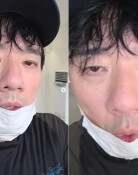Anti-Japanese and Anti-Chinese National Sentiments Clash
Anti-Japanese and Anti-Chinese National Sentiments Clash
Posted April. 17, 2005 23:31,
Anti-Japanese protests in China caused by Japans history book distortions and sovereignty conflicts are escalating to a feud over national sentiments.
The two nations foreign ministers held a conference yesterday and began looking for countermeasures to mollify the crisis, but because anti-Japanese protests in China are spreading all across the nation and anti-Chinese sentiment is rapidly escalating in Japan as well, it s expected that the bilateral conflict will not quiet down easily.
Chinese and Japanese foreign ministers Li Zhaoxing and Nobutaka Machimura, respectively, held a conference in Beijing yesterday and agreed that aggressive and violent protests do not assist the development of bilateral relations. Nonetheless, when it came to the causes for the protests, they were sharply opposed.
Foreign Minister Li stressed that the China-Japan relationship is facing a crossroads because Japanese leaders pay pilgrimages to the Yasukuni Shrine and distort history books, so Japan should take measures to reflect on its history and move forward to the future.
To Lis remark, Japanese Foreign Minister Machimura suggested a plan to conduct a joint research on historical issues and demanded China apologize for stone-throwing at Japanese diplomatic premises, prevent its recurrence, and guarantee safety for its nationals and companies in China.
In addition to anti-Japanese protests that occurred in Shanghai, Tianjin, and Hangzhou in Zhejiang Province on April 16, the protests spread to some 20 cities including Shenyang in Liaoning and Shenzen in Guangdong provinces yesterday. Protests burst out in Hong Kong, too.
In Shanghai, especially, which is Chinas economic center where massive Japanese companies have advanced, 100,000 people participated in the protest and shocked Japan. Anti-Japanese protests in Donggwan in Guangdong Province spread to strikes of workers employed by Japanese companies.
Anti-Chinese sentiment in Japan has also risen. In addition to the delivery of an intimidation letter with a razor in it to the Chinese Consulate General in Osaka on April 16, a Japanese man threw a glass bottle at the Consulate General and made an attempt to burn himself to death. On April 15, the Chinese Embassy in Tokyo received a letter containing white powder, the ambassador residences mailbox and doorplate were damaged, and its wall was spray painted with graffiti in red paint as well.
Moreover, Japanese tourists and students have cancelled visits to China one after another, and some Japanese in China are returning to Japan.
Yoo-Seong Hwang yshwang@donga.com




![[김순덕의 도발] ‘李부터 연임’ 개헌, 이 대통령은 가능성을 말했다](https://dimg.donga.com/c/138/175/90/1/wps/NEWS/IMAGE/2026/01/16/133172656.1.jpg)

![“설거지해도 그대로”…냄비 ‘무지개 얼룩’ 5분 해결법 [알쓸톡]](https://dimg.donga.com/c/138/175/90/1/wps/NEWS/IMAGE/2026/01/15/133164664.3.png)
